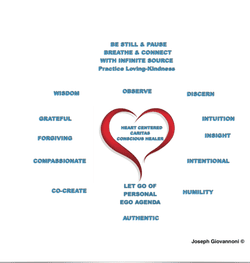
The ego is a five-sensory personality that responds to fear and human needs by seeking external power without concern for others. The ego’s consciousness is informed by the five senses and experiences a divided self that focuses on survival. Relying on the ego consciousness to cope with fear and a sense of lack misguides the individual to develop love for external power and physical dominance. This can lead to brutality towards another. This aspect of our five sensory personality has limitations and is the source of fear, anger, and other human struggles, and is a barrier to peace. Input that is limited to the five senses creates a worldview of separateness. It limits the evolution of our human consciousness.
Caritas Consciousness is a non-judgmental way of perceiving the world as whole. In this state of mind we refrain from blaming or engaging in negative emotions. Caritas Consciousness evolves when we seek truth and wisdom, and practice non-judgmental justice. We are released from the need to judge, when our consciousness is informed by intuition, observation, and discernment for the purpose of gaining insight and clarity. Caritas Consciousness is a commitment to repeated multisensory practice guided by a holistic worldview, being aware that all human beings are interconnected. Caritas Consciousness begins with an awareness of our thinking and emotions so that we can make choices consciously, responsibly, and wisely. Caritas Consciousness requires being open to the non-physical reality, and the spiritual and mystery of the unknown.
A person who practices Caritas Conscious intends to focuses on expressing love, harmony, forgiveness, co-creation and reverence for life. This person pursues insight, clarity, and creative solutions to humanity’s problems. Caritas Consciousness reflects respect for all of humanity and is guided by wisdom, compassion, and love to re-pattern violence. The efficacy of Caritas Consciousness is measured by the authentic power experienced that results from each caring interaction.
References:
--Watson, J., (2008). Nursing The Philosophy and Science of Caring. University of Colorado Press, Boulder, Colorado.
—Zukav, G., (1989). The Seat of The Soul. Simon and Schuster Paperbacks. New York, NY
Caritas Consciousness is a non-judgmental way of perceiving the world as whole. In this state of mind we refrain from blaming or engaging in negative emotions. Caritas Consciousness evolves when we seek truth and wisdom, and practice non-judgmental justice. We are released from the need to judge, when our consciousness is informed by intuition, observation, and discernment for the purpose of gaining insight and clarity. Caritas Consciousness is a commitment to repeated multisensory practice guided by a holistic worldview, being aware that all human beings are interconnected. Caritas Consciousness begins with an awareness of our thinking and emotions so that we can make choices consciously, responsibly, and wisely. Caritas Consciousness requires being open to the non-physical reality, and the spiritual and mystery of the unknown.
A person who practices Caritas Conscious intends to focuses on expressing love, harmony, forgiveness, co-creation and reverence for life. This person pursues insight, clarity, and creative solutions to humanity’s problems. Caritas Consciousness reflects respect for all of humanity and is guided by wisdom, compassion, and love to re-pattern violence. The efficacy of Caritas Consciousness is measured by the authentic power experienced that results from each caring interaction.
References:
--Watson, J., (2008). Nursing The Philosophy and Science of Caring. University of Colorado Press, Boulder, Colorado.
—Zukav, G., (1989). The Seat of The Soul. Simon and Schuster Paperbacks. New York, NY